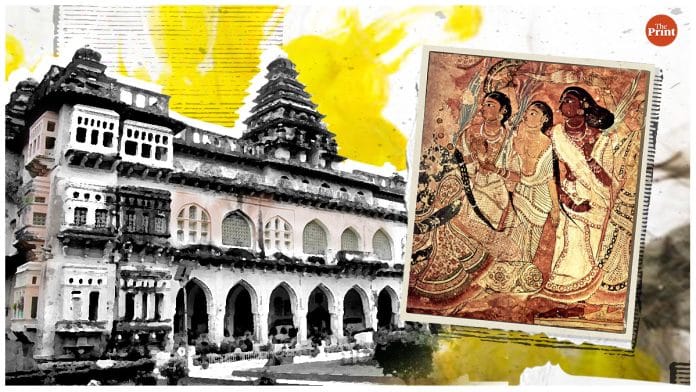Thank you dear subscribers, we are overwhelmed with your response.
Your Turn is a unique section from ThePrint featuring points of view from its subscribers. If you are a subscriber, have a point of view, please send it to us. If not, do subscribe here: https://theprint.in/
History moves in cycles, but it also invents new dangers. Seventy-five years after the first Cold War hardened into a world-dividing ideology, the spectre of a new cold age loom. The United States stands at a crossroads, Europe trembles between liberal exhaustion and far-right resurgence, Russia searches for imperial memory, and China fuses state-capitalism with strategic patience. Into this fragile architecture walks Donald Trump once more — not as an aberration, but as an avatar of a global shift toward transactional nationalism and power unrestrained by ethic.
The last Cold War was ideological: capitalism versus communism, West versus East. The emerging one is more primal. It pits fear against interdependence, masculinity politics against diplomacy, and national spite against collective survival. Where the twentieth century confronted rival utopias, the twenty-first risks rivalry without purpose — a contest of ego, grievance, and strategic insecurity.
Trump does not create this world alone. He merely accelerates it. His worldview — America first, alliances conditional, multilateralism disposable — crystallises a broader political zeitgeist: power must be used, not justified; history is not a teacher but a playground; nationalism is not civic but civilisational. Democracy becomes theatre, diplomacy becomes manipulation, and peace becomes naivety.
A New Cold Logic
Trump’s ambitions are not subtle. They are rooted in three propositions:
First, alliances are instruments, not principles. NATO becomes negotiable, Europe becomes a delinquent dependent, and Asian partners are pressured to choose rather than balance. Alliances cease to embody values; they become protection rackets.
Second, economic coercion replaces global cooperation. Tariffs are not policy but punishment; sanctions not tools of restraint but assertion; trade becomes war by other means.
Third, power precedes morality. If force works, use it; if rules constrain, break them; if truth interferes, replace it.
This does not simply mirror Cold War thinking — it reduces it. Truman and Eisenhower, for all their flaws, believed in institutional power and global leadership. Trumpism strips America of universal ambition, leaving behind only appetite. It is not grand strategy; it is grievance as foreign policy.
The Emerging Camps
The new alignments do not mimic the binary of 1945–1989. They are fluid, multipolar, and transactional. A U.S.-led bloc defined not by liberalism but by strategic self-interest and coercive capitalism.
A China-Russia axis, pragmatic but united by hostility to Western dominance and desire for sovereign strategic space. A global South searching for autonomy, tired of being courted only as a swing vote or resource frontier.
Europe, meanwhile, risks drifting into right-wing mimicry — asserting autonomy not to protect norms, but to imitate American unilateral instinct. When liberal democracies defend their values selectively, their moral vocabulary hollows.
India faces a choice
India is not a spectator. It is a pivotal state — and a fragile one. New Delhi speaks the language of multi-alignment, but practices an increasingly personalised nationalism that echoes global illiberal currents. It seeks U.S. technology, Russian arms, Middle-Eastern strategic finance, and Chinese-market insulation. That is not strategy; it is hedging under duress.
Will it be an autonomous pole of peace and plurality — or a subordinate pillar in a militarised order?
Will it revive its Bandung inheritance, or surrender it to domestic culture-war triumphalism and great-power flattery?
As Kwame Nkrumah warned, liberation is betrayed when nations seek “new masters” under the guise of sovereignty (Consciencism, 1964). Non-alignment was never neutrality; it was moral agency. “We face neither East nor West,” he declared, “we face forward.”
India, too, must decide whether it faces forward or merely sideways — pulled by Washington, haunted by Beijing, comforted by Moscow, and flattered by the Gulf.
The Ethical Question
There remains space for ethical agency — for Europe to defend multilateralism rather than drift into right-wing mimicry; for the global South to revive a non-aligned ethic of peace and development rather than retreat into transactional neutrality; for citizens everywhere to remember that power without principles breeds ruin, even when wrapped in patriotic rhetoric.
The question before the world is ultimately philosophical: shall we accept a return to naked power politics, or insist that civilisation means rising above them? Realism in international affairs need not extinguish ethical imagination. As Hans Morgenthau warned, political realism without a moral compass “descends into political pathology” (Politics Among Nations, 1948, pp. 9–10). Today, we require a realism rooted in human dignity — not domination.
The New Iron Curtains
The new iron curtains are forming, not from steel but from cynicism, fear, and the deliberate fraying of interdependence. They are not inevitable. They can still be halted — but only if nations recall that unrestrained power does not secure civilisation; it corrodes it. Our task is not to resurrect a past order, but to forge a new ethic of cooperation suited to a world where power is diffuse, technology accelerates conflict, and the human future depends not on victory, but on restraint.
As Bertrand Russell warned at the dawn of nuclear rivalry: “Shall we put an end to the human race; or shall mankind renounce war?” (Russell–Einstein Manifesto, 1955)
Walls are rising again, but they need not harden into permanence. The tragedy of our time would not be that we entered a new cold age — but that we forgot we had a choice.
References
Hans J. Morgenthau, Politics Among Nations, 1948.
Kwame Nkrumah, Consciencism: Philosophy and Ideology for Decolonization, 1964.
Russell–Einstein Manifesto, 1955.
Bandung Conference Final Communiqué, 1955.
These pieces are being published as they have been received – they have not been edited/fact-checked by ThePrint.


